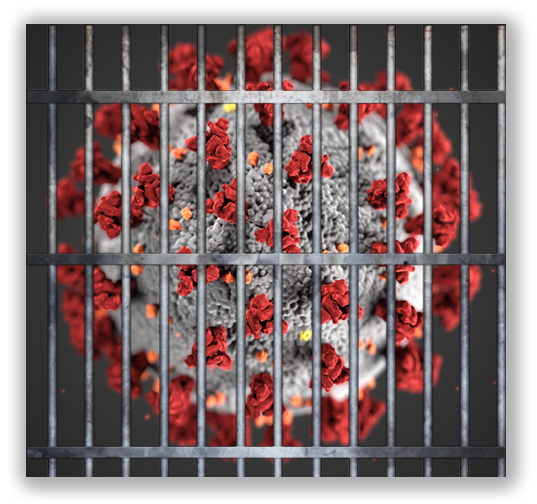We post news and comment on federal criminal justice issues, focused primarily on trial and post-conviction matters, legislative initiatives, and sentencing issues.

ATTORNEY GENERAL TELLS BOP TO SEND SOME PEOPLE HOME
Attorney General William Barr moved yesterday to release some federal inmates at heightened risk from the coronavirus, but he said no one would be freed immediately under the policy because of the need to make sure prisoners are not spreading the virus into the community.
 Barr told the BOP in a memo to prioritize granting home confinement to inmates who were convicted of lower level crimes, have shown good conduct behind bars and have plans for release that won’t put them and others at greater risk for contracting the virus.
Barr told the BOP in a memo to prioritize granting home confinement to inmates who were convicted of lower level crimes, have shown good conduct behind bars and have plans for release that won’t put them and others at greater risk for contracting the virus.
“We don’t want our institutions to become petri dishes,” Mr. Barr said at an unrelated news conference. “We have the protocols that are designed to stop that. One of those tools will be identifying vulnerable prisoners who would make more sense to allow to go home to finish their confinement.”
The attorney general said he asked BOP officials last week about protecting vulnerable inmates and lowering the chances of a serious outbreak by lowering prison populations.
“I asked if it was possible to expand home confinement, particularly for those older prisoners who have served substantial parts of their sentences and no longer pose a threat and may have underlying conditions that make them particularly vulnerable,” Barr said.
Barr told prison officials to give priority to inmates held in low and minimum security facilities; to those who haven’t been involved in violence or gang activities; and to those with low PATTERN scores. Those convicted of serious offenses, including sex crimes won’t be eligible, Barr said.
Barr’s guidance overlaps with a provision in the relief bill the U.S. House of Representatives is expected to pass TODAY, which lets the BOP shift federal inmates into home confinement sooner. Under 18 USC § 3624(c) as currently written, home confinement is capped at six months or 10% of a sentence, whichever is shorter. The bill removes that limit during the pandemic. The moves come as prisons are detecting more cases of the deadly virus.
 As of Thursday morning, Barr said six federal inmates and four staffers had tested positive for the virus, prompting the lockdown of several facilities, including ones in New York City, Atlanta and Louisiana. Barr said he’s getting reports of additional cases as well, but didn’t have the details.
As of Thursday morning, Barr said six federal inmates and four staffers had tested positive for the virus, prompting the lockdown of several facilities, including ones in New York City, Atlanta and Louisiana. Barr said he’s getting reports of additional cases as well, but didn’t have the details.
As of yesterday’s 3 pm BOP update, the number had climbed to 10 inmates and eight staff, at MDC Brooklyn, MCC New York, USP Atlanta, FCI Oakdale and in halfway houses in Phoenix and Brooklyn. Staff have tested positive at Butner, NC; Ray Brook, NY; New York City; Danbury, CT; Yazoo City, MS; Leavenworth, KS; Atlanta, GA; and Grand Prairie, TX.
Criminal justice experts welcomed the idea of releasing more inmates to home confinement, but hoped the BOP would break its track record of granting release or home confinement in fewer cases than it could. Kyle O’Dowd, associate executive director of policy for the National Association of Criminal Defense Lawyers, told Law360 that while the law and the memo are steps in the right direction, it remains to be seen how the BOP will carry them out.
“My concern is that it won’t be implemented as robustly as it needs to be. There is a history of BOP being pretty conservative in their application of authorities they already have,” O’Dowd said.
Any prisoners moved out of federal facilities as part of the effort would be held in quarantine within the prison for 14 days before release to make sure they are not infectious, Barr’s memo said. Those convicted of sex offenses would not be considered for release, and those serving time for “serious offenses“ would have less chance of getting out, the directive said.
In some cases, vulnerable prisoners might be at less risk in jail than they would be at home, Barr argued. “Many inmates will be safer in BOP facilities where the population is controlled and there is ready access to doctors and medical care,“ he wrote.
Ohio State University law professor Doug Berman wrote in his Sentencing Law and Policy blog that
[e]ven assuming that only a very small percentage of prisoners, say, only 1 out of every 15 current federal prisoners, meet the home confinement criteria, that would still mean that well over 11,000 federal prisoners would be eligible to head home to serve out the rest of their sentences. Because BOP has a well-earn reputation for being unwilling or unable to help prisoners get out of federal facilities early, I am not so confident that we will soon be seeing thousands of federal prisoners heading home. But the directive from AG Barr now would seem to make that more of a possibility.
Politico, Feds may send some prisoners home due to virus risk (Mar. 26, 2020)
Wall Street Journal, Barr Tells Federal Prisons to Increase Use of Home Confinement, Fearing Spread of Coronavirus (Mar. 26, 2020)
Law360.com, Federal Prisons Can Send More Inmates Home. Will They? (Mar. 26)
Sentencing Law and Policy, Will thousands of federal prisoners be eligible for home confinement under AG Barr’s new guidelines? (Mar. 26)
– Thomas L. Root





